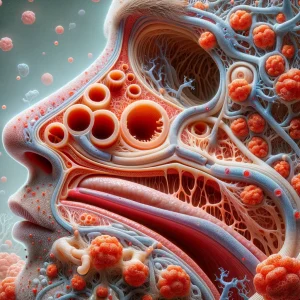CRS is a condition where the sinuses and nasal passages stay inflamed for a long period, making it hard to breathe and often causing pain or pressure in the face.
Causes:- Allergies: Frequent exposure to allergens like dust or pollen can trigger inflammation.
- Infections: Recurrent sinus infections can contribute to the development of CRS.
- Nasal Polyps: Small growths in the nasal passages may block airflow and lead to chronic inflammation.
- Immune System Issues: People with weakened immune systems or autoimmune disorders are more prone to CRS.
- Individuals with allergies: Those who suffer from allergic rhinitis or asthma are at higher risk.
- Smokers: Smoking irritates the nasal passages and can increase the risk of CRS.
- People with respiratory infections: Repeated or untreated infections can increase the likelihood of developing the condition.
- Individuals exposed to pollutants or irritants: Regular exposure to air pollution, chemicals, or occupational hazards may raise the risk.

